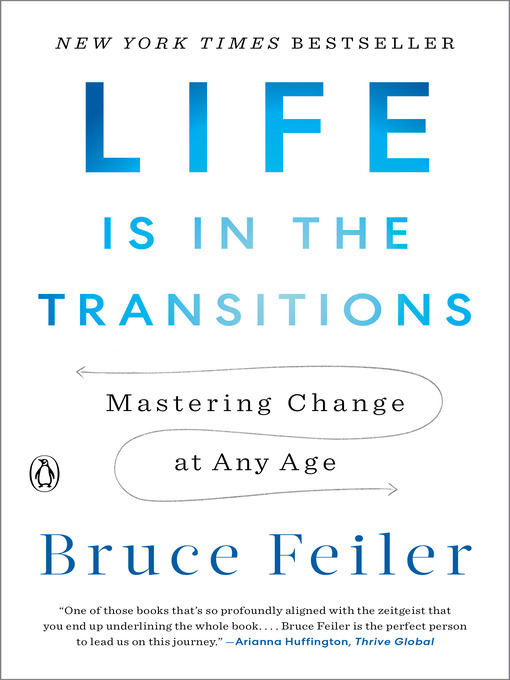
Life Is in the Transitions
Mastering Change at Any Age
کتاب های مرتبط
- اطلاعات
- نقد و بررسی
- دیدگاه کاربران
نقد و بررسی

March 1, 2020
"Life is the story you tell yourself." So writes the bestselling author, encouraging readers to discover that story for themselves. The meaning of our lives becomes clear only through storytelling: How did you survive being rejected in work or love? How did you make your way through divorce, illness, war? One thing that storytelling tells us is that the arc of life is never so neat as a fairy tale. Feiler writes that while many of us assume the path of life is one of upward progress, we "are shocked to discover they oscillate instead." It seems unlikely that any adult would be so shocked, but the assertion makes a useful hook on which the author hangs the idea that lives have different shapes--some butterflies, some spirals, some, to borrow from the British, pears. Feiler continues, abandoning notions of linearity for the sloppy, unpredictable courses that we live, whether through life-threatening illness or accident, drug addiction, the loss of job or loved one, and so forth. He is generous in opening his pages to the stories of others by way of illustration. One of the most affecting relates the tale of the granddaughter of Gen. George Patton, who had been born into wealth and prestige and abandoned it to become a nun--a path that did not happen overnight, thanks to an abbess who ordered her to go live a little beforehand, marking the transition to holy orders thus: "Go slow; insist on deep, personal reflection; mark each stage of the journey with carefully constructed rituals that delineate and demarcate the new status achieved." That seems a useful mantra for lives lived in the secular world as well, and Feiler provides plenty of examples as well as a well-constructed set of questions as prompts for reflection. An unusual self-help book, of particular use to those contemplating writing a memoir or otherwise revisiting their past.
COPYRIGHT(2020) Kirkus Reviews, ALL RIGHTS RESERVED.

April 1, 2020
Best-selling author Feiler (The First Love Story, 2017; The Secrets of Happy Families, 2013) offers an engaging consideration of how people navigate the highs and lows in their lives. His observations are based on his "Life Story Project," a three-year effort during which he interviewed 225 people from across the U.S. Listening to these personal histories made him realize that people's lives are filled with unexpected events, and that learning how to transition through these inevitable jolts is a crucial skill that must be learned. Using scenarios pulled from his trove of interviews, Feiler identifies types of life "disruptors," ranging from new jobs to suicide attempts. He advocates for seeing these changes as opportunities for renewal, and chances for creating new narratives. All this advice is laid out in logical, sequential chapters, and occasional graphs and checklists bolster Feiler's reasoning. His relaxed, informal style is reassuring, and the numerous anecdotes gleaned from his wide variety of interview subjects keep the narrative fresh. His encouraging counsel will appeal to many.(Reprinted with permission of Booklist, copyright 2020, American Library Association.)

May 18, 2020
Feiler (Council of Dads), host of PBS’s Sacred Journeys, offers in this insightful work timely suggestions for anyone adapting to significant life changes. His personal experiences, including his father’s Parkinson’s diagnosis and subsequent suicidal thoughts, and Feiler’s own bout with cancer and near-bankruptcy, motivated him to study if the ways personal narratives are crafted can help one weather difficult times. To that end, he launched the Life Story Project, soliciting 225 life stories from Americans living in all 50 states and of “all ages, backgrounds, and walks of life.” He measures each story against 57 variables, such as how old a person was when they experienced transitions and the life advice they found most useful, and concludes that the idea that certain things should happen as part of the normal “stages of life” (or that everyone goes through a series of life passages) is mistaken and harmful. He also presents evidence discrediting the notion of the midlife crisis and demonstrates that everyone’s life contains multiple significant “upheavals and uncertainties,” which should thus be accepted as normal, contrary to conventional wisdom. The findings buttress practical suggestions for responding to major change, including identifying emotions, giving up old mindsets, testing alternatives, and seeking help from others. This logical, persuasive resource will resonate with any self-help reader.

December 1, 2019
Having spent a lifetime examining the stories that give our life meaning, New York Times best-selling author Feiler says that today's stories don't follow the patterns he's seen. Traveling cross-country to collect and collate hundreds of tales, he concluded that our current narratives aren't linear (i.e., with love followed by marriage and one job a constant) and proposes a new pattern for our times.
Copyright 2019 Library Journal, LLC Used with permission.

May 1, 2020
Feiler's new book (The Secrets of Happy Families; Walking the Bible) explains that instead of going through life following a series of calibrated progressions, people experience it as a complex swirl of celebrations, setbacks, triumphs, and rebirths. The key to thriving through disruptors and lifequakes is to make meaning in times of change. Feiler details a model for life transitions based on thousands of interviews with people from all walks of life and tells readers how to memorialize changes and give up old mind-sets. A helpful bonus is the complete outline for writing one's own story or that of others. VERDICT This highly recommended title couldn't be more timely.
Copyright 2020 Library Journal, LLC Used with permission.

























دیدگاه کاربران